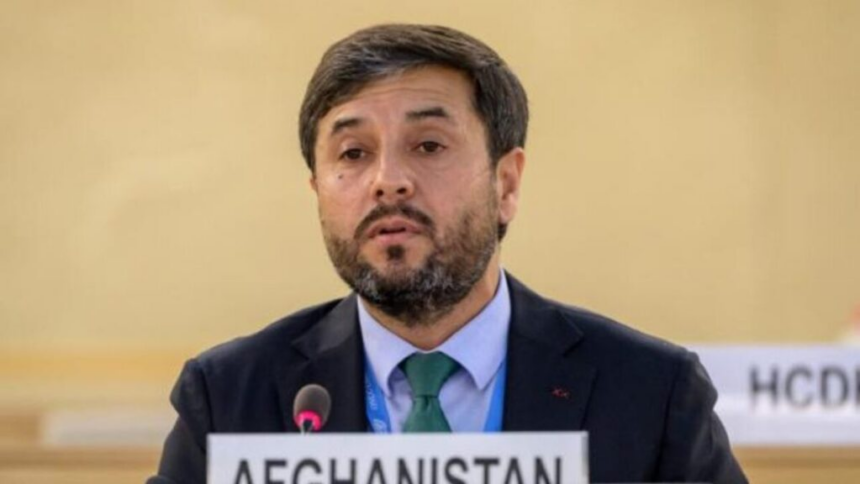RASC News Agency: Mounting criticism continues to engulf the United Nations Assistance Mission in Afghanistan (UNAMA) over its controversial “Mosaic” initiative, a political roadmap that purports to guide Afghanistan’s reintegration into the international community. Yet, far from fostering inclusivity, the plan has been lambasted by Afghanistani representatives, civil society groups, and political factions as a covert attempt to normalize relations with the Taliban a regime widely condemned for its authoritarianism, brutality, and systemic abuse of human rights. Nasir Ahmad Andisha, Afghanistan’s permanent representative to the United Nations Office in Geneva, has emerged as one of the most prominent critics of the UN’s process. In a sharp rebuke, Andisha revealed that non-Taliban political stakeholders and civil society actors had been categorically excluded from shaping the framework of the Mosaic initiative. Despite the submission of detailed policy recommendations by human rights organizations, political parties, women-led movements, and independent Afghanistani figures, UNAMA reportedly failed to acknowledge or incorporate any of these perspectives. No formal response or consultation was extended to these non-Taliban entities.
“This so-called ‘Mosaic Plan’ has been drafted in an opaque manner, absent of public consultation, and devoid of legitimacy,” Andisha said. “It reflects not the aspirations of the Afghanistani people, but rather the political interests of the Taliban and their foreign interlocutors in the Doha process.” UNAMA has portrayed the Mosaic initiative as a blueprint for facilitating dialogue between Afghanistan and the international community. Yet its practical implications have sparked widespread alarm. Critics argue that by implicitly granting the Taliban a central role in the plan despite their violent seizure of power in 2021 and total rejection of democratic norms the UN risks legitimizing a regime that governs through coercion, misogyny, and religious fundamentalism.
According to Andisha, the Taliban has submitted three key demands through the Mosaic framework: the release of Afghanistan’s frozen foreign reserves, the removal of Taliban leaders from international sanctions lists, and the transfer of Afghanistan’s diplomatic missions to Taliban control. “These demands,” he warned, “represent a calculated attempt by the Taliban to achieve international recognition without making a single concession to democratic governance, human rights, or pluralism.” International stakeholders, including G7 countries, have repeatedly cited three conditions for engagement with the Taliban: the formation of an inclusive government, respect for human rights particularly women’s rights and a credible commitment to combating terrorism. However, observers warn that these conditions have been rendered hollow, as they lack clear enforcement mechanisms and have been repeatedly flouted by the Taliban without consequence.
The domestic backlash has been fierce. The Atta Mohammad Noor faction of Jamiat-e Islami issued a strongly worded statement, denouncing the Mosaic initiative as “a veiled lobbying campaign for the political legitimization of the Taliban.” The statement warned that “any normalization of relations with this violent and regressive regime constitutes an act of betrayal against the Afghanistani people and the sacrifices they have made for freedom.” Women’s groups, who have borne the brunt of Taliban oppression, have also voiced unequivocal opposition. The Women’s Protest Movement and the Lantern of Women’s Freedom, two grassroots coalitions operating under severe risk, condemned the UN’s approach. In a joint declaration, they urged the United Nations to abandon what they described as “appeasement diplomacy” and to instead pursue firm diplomatic isolation of the Taliban, coupled with stronger international sanctions and legal accountability for their crimes against humanity.
While UNAMA has responded to the criticism by asserting that the Mosaic Plan remains in a “consultative phase” and that outreach efforts are ongoing, skepticism remains high. Afghanistani civil society and political figures argue that true consultation requires not just token engagement, but genuine power-sharing and recognition of the country’s diverse political and ethnic landscape none of which is possible under Taliban rule. As concerns over legitimacy, transparency, and human rights deepen, the question confronting the international community is no longer whether to engage with the Taliban, but whether doing so amounts to complicity in the erosion of Afghanistan’s democratic aspirations. Without the meaningful inclusion of non-Taliban forces, and without conditions grounded in enforceable standards, the Mosaic Plan risks becoming a smokescreen masking international failure behind a facade of diplomacy.






